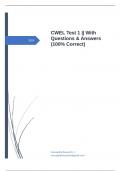CWEL Test 1 || With
2024 Questions & Answers
(100% Correct)
Conceptial Research ||
conceptialresearch@gmail.com
, CWEL Test 1 || With Questions &
Answers (100% Correct)
Children are not considered abused or neglected when:
a. Parents leave their children in the care of an adult relative for a period of time
b. Parents depend on spiritual means through prayer alone for the treatment or cure
of disease
c. Children do not attend school in accordance with the requirements of the School
code
d. All of the above - ANSWER - d. ALL OF THE ABOVE
Confidentiality: - ANSWER - Allows certain people to have access to records in
accord to providing protective services & safety to children
Individuals who can take protective custody of children are:
a. Permanency workers
b. Officers of local law enforcement agencies
c. Child protection workers
d. Any person in a supervisory or managerial role
e. b & c - ANSWER - e. B & C
The four service goals of the Department are: - ANSWER - Family preservation,
family reunification, youth development and adoptions/attainment of permanent living
arrangements
In Illinois:
a. Child welfare services are provided by both public and private agencies
b. Child welfare services includes licensing and contracting with other service
providers
c. Child welfare practice is delivered in accordance to rules and procedures which
are codified through the Illinois legislature
d. All of the above - ANSWER - D. ALL OF THE ABOVE
The forms of DCFS Rules and Procedures include: - ANSWER - Rules, policy
guides, administrative procedures and interpretations
The federal law which provides federal foster care reimbursement to the State of
Illinois is: - ANSWER - Social Security Act - Title IV-E
The Interstate Compact Act governs: - ANSWER - The provision of care of children
in foster care or adoption from one state to another
The permanency initiative of 1997 requires:
a. Selection, by the court, of a permanency goal for children
, b. Diligent searches for missing parents
c. That expedited termination of parental rights may be pursued when aggravating
circumstances exist
d. Concurrent planning
e. All of the above - ANSWER - ALL OF THE ABOVE
Infants (birth-2 1/2) - ANSWER - Does not expect basis needs to be met, inability to
calm, irritability, delays in speech and motor
development, failure to thrive, developmental delays
Young Children (2 1/2 -6) - ANSWER - Low frustration tolerance, lying, problems
with toilet
training, avoidant, anxious, disorganized, poor boundaries,
inappropriate emotional responses, looking away,
hyperactive
Adolescents - ANSWER - Difficulty establishing relationships, drug use,
delinquent behavior, difficulty seeing a future for self,
skipping school, inattention and increased risk of fainting
School Age - ANSWER - Oppositional, lying, stealing, hoarding food, poor
peer relationships, inattention, learning disabilities,
sees self as "bad", self-harm, suppressed immune system,
headaches, stomachaches, intolerance of food
Social Connection - ANSWER - Parents need friends. Provides family with a sense
of belonging, emotional support and informal back up for life' challenges
Social and Emotional
Competence of Children - ANSWER - Parents need to help their children
communicate.
Children with well-developed social and emotional
competencies are better equipped.
Parental Resilience - ANSWER - Be strong and flexible. The critical ability when
faced with problems and stressors. Adapting well in the
face of adversity
Concrete Supports in
Times of Need - ANSWER - We all need help sometimes. Supports include
adequate food, clothing and shelter which are
beneficial in times of other stressors in life.
Parent-Child Relationship - ANSWER - Give your child the love and respect they
need. Parent-
child relationships that are warm, nurturing and
responsive.
The federal emphasis for child welfare practice is on: - ANSWER - Permanency,
safety, and well-being




